In the work world the true generalist is very different from the specialist.
The specialist tends to have a deep understanding of a certain content area while the generalist has a broader scope of the work landscape. The pros of being a generalist are understanding connections between departments and, theoretically, the ability to adapt to handling many different tasks. The cons include exhaustion from doing too many tasks over time (we tend to reward good workers with more work).

The benefits to being a specialist include having a deep knowledge with less competition, but the cons include the need to avoid becoming obsolete as technology continually changes.
The school of thought has always been that there are more opportunities for the Generalist. Are there? Has that started to change? As the Gig Economy begins to grow, and the work atmosphere is forever changed by COVID, it’s becoming increasingly clear we are living in a Specialized World.
In my interview on the Stories and Strategies Podcast, I share how I decided to specialize in the field of public relations after years of working as a generalist. It wasn’t until I packed up my bags and moved to London, England that I finally figured out my true calling.
When I was first starting in my career and working as a marketing manager, it was drilled in my head that we needed to master a variety of skills to succeed and get that promotion.
I believe that advice is still relevant if you are new to the workforce and trying to figure out where you fit in. However, once you’ve been in the workforce for a while, you need to stand out for your unique personal brand.
My job description as a marketing manager was a very broad list of general marketing responsibilities. I organized industry tradeshows, I took product photos, I wrote product copy, I pitched the media, and I even created the brochures.
I was a Jill of all trades, but really a master of nothing. My goal was always to get what needed to be done to promote the company’s wide range of products, and I felt that I was successful at the time.
However, I started to feel burnt out and I wanted a change. The walls of my cubicle inside that organization started to feel very small and I knew I was meant for something bigger. It wasn’t until I moved across the pond to London, England that I truly felt unknown.

I lost my sense of identity when I left that job. All the sudden I didn’t know how to describe what I did for a living. I used to introduce myself by my job title at networking functions, now I was just Talia.
I didn’t have confidence in my own abilities because when I was trying to find a job in a new country, I found it impossible to stand out.
Although I was great at marketing the company’s brand image, I neglected to create my own unique personal brand.
I noticed that companies were starting to look for more specialized skills, and I still wasn’t sure what I really brought to the table because I was always working as a marketing generalist.

When you become known for your unique area of expertise, you are no longer attached to a specific employer or job title. Your skills are transferrable, and you are building your career or business on your own terms. With so many people displaced in their jobs during the pandemic, we believe this conversation is more important than ever.
Join me for our PR Planathon event! We will be discussing how you can grow your career or business by showcasing your expertise as a “thought leader.”
But the biggest game changer? Taking the time to showcase your expertise and build your memorable brand image.
I have 7 ways that you can get started with this strategy, and I want to send it to you in my NEW thought leadership guide.







